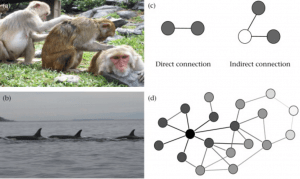Friends of friends: are indirect connections in social networks important to animal behaviour?
We refer to indirect connections as friend of a friend (or enemy of an enemy) relationships, and as we discussed in class, several studies show that they can directly affect our well-being, health, financial success and ability to find a job. These connections can stretch up to multiple degrees of separation, and they are ultimately responsible for the giant components found in social networks. Studies on animal behavior often focus on direct connections and associations between pairs of individuals. However, there is growing interest among researchers to study the impact of indirect connections in animal societies. These connections can arise from several different associations such as (a) grooming in groups of rhesus macaques, and (b) nearest-neighbor proximity in killer whales.
This paper claims that indirect connections are essential to our understanding of animal behavior, especially in gregarious species, and it presents an overview of the studies focused on the impact of indirect connections in animal societies. Specifically, the author highlights six major lines of research in this field including the genetic basis of indirect connections, the fitness consequences of indirect connections, the association between indirect connections and social cohesion, the impact of indirect connections on the transmission of information, the maintenance of cooperation through indirect connections and the cognitive basis of indirect connections. I will be giving a brief overview of the prominent findings in each line of research.
Are indirect connections heritable?
Across many species, there is no evidence suggesting that an individual’s tendency to be indirectly connected is heritable. Yet, in some species of large mammal and birds that form highly differentiated relationships, indirect connections reflect a meaningful way to navigate their social environment. In fact, one study of human friendships found several measures of indirect connectedness to be heritable. Overall, there has not been enough research on this topic to arrive at any conclusion of heritability in animals, yet it is suggested that skills and social temperaments related to indirect connections may be heritable in some gregarious species.
Do indirect connections have fitness consequences?
There is mounting evidence that indirect connections may have fitness consequences for several species, but evidence of causality remains unclear. In fact, in a population of rhesus macaques, one study found that the amount of grooming received from others, and the amount of time spent around others, were significant predictors of reproductive success, as measured by the proportion of infants who survived to 1 year of age.
The association between indirect connections and social cohesion
For many gregarious animals, maintaining social cohesions is critical to the success of each individual in the group. However, it ought to be noted that dispersal is also sometimes necessary to maintain genetic diversity and reduce competition. Most studies of social cohesion and indirect connections have focused on the importance of individuals with high betweenness that connect otherwise isolated parts of a network. Overall, the results of these studies have been mixed, but in one study of 11 species of Old-World monkeys, removal of individuals with high betweenness resulted in disconnected grooming networks.
Impact of indirect connections on transmission of information
Many gregarious animals are dependent on a steady flow of information to effectively use their habitat and decide when and where to migrate as a group. Indirect connections play an integral role in the transmission of this information, as information often makes its way across a network through a series of paths involving indirect connections. While the importance of indirect connections for information transmission has been traced through several human studies, only a few studies have investigated the spread of information through networks in animal societies. One study of humpback whales found that indirect connections and ‘bridges’ had huge influence in transmitting new socially learned breeding songs across various populations. However, there are still no definitive conclusions regarding the role of indirect connections in collective knowledge.
Maintenance of cooperation through indirect connections
The maintenance of cooperation through indirect connections is an evolutionary puzzle. It is commonly thought that cooperation in animal societies is predominantly maintained through direct connections, yet there are two recognized types of indirect exchange that may support cooperation: generalized exchange and reputation-based exchange. In generalized exchange, one individual helps another which causes that individual who received the help to help another. In reputation-based exchange, one person helps another which causes a different person to help the person who originally gave help. The results in nonhuman studies have been very mixed, but the potential consequences are clear. For example, cooperative actions from individuals with high reach in their networks could quickly cascade throughout the network through general exchange.
The cognitive basis of indirect connections
Animals seem to be largely influenced by and to influence associations between pairs of others. There is mounting evidence that some animals may have an understanding of third-party relationships and use transitive inference in deducing unknown relationships from known relationships between others. For example, one study found that male cichlid fish are able to infer the relative dominance status of other males by using the males’ relationships with others. In addition to third-party associations, it has even been suggested that some animals have some understanding of the global properties of their networks.
Source: https://www.sciencedirect.com/science/article/pii/S0003347215000305?casa_token=yMsdg6nRhqsAAAAA:zPQyeaJaFA0JCkvGHE2AMY2GF-xj51NRRY8byWrjFyqMZzdhMikj5nNIacjq1p-fndrIZ8j-LQ

